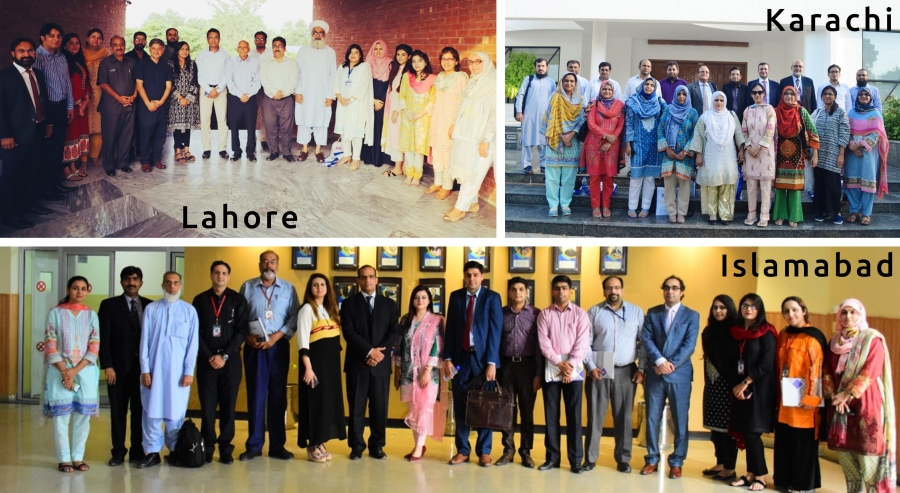Workshops
Workshop on "Teaching through Cases"

Venue: Islamabad, Karachi. Lahore
|
Workshop - “Teaching through Cases” |
|||
|
Objectives: |
|||
| The case teaching method has been one of the most popular and successful method of teaching in business schools, especially in the business disciplines all over the world. This workshop is aimed at encouraging business faculty from Pakistani business schools to improve their case teaching skills.This workshop also provides a platform for experienced faculty members to discuss on a specialized platform their learnings, and the issues they faced in applying the case method, from previous teaching of cases in Pakistan. This workshop is not a one-off intervention but part of a long-term effort by NBEAC to improve business school teaching in Pakistan. | |||
|
Course Content: |
|||
|
Faculty members of Pakistani business schools will learn how to teach a case to the MBA audience in a business school. At the end of the workshop, they will feel more confident around the following questions
|
|||
|
Learning Outcomes: |
|||
|
The participants will develop an understanding of the followings by the end of this workshop:
|
|||
|
Structure: |
|||
|
The workshop will be conducted over one day by three experienced case method teachers and is divided into two parts. In the morning session, participants will wear a "student hat" and the case teacher will wear "teacher hat". This will allow participants to sit through in a demonstrative session (an exemplar) of case method teaching. Participants will "unpack" one or two cases in this session: They will have read and prepared the case(s) assigned to them. They are required to participate "100%" through asking questions and through arriving at some sort of a solution (or solutions) under the guidance of the "facilitator". In the second session, both the participants and the teacher will wear "Participants in a workshop" hats and jointly and interactively discuss a) how the first session was managed by the case method teacher b) what were the pros and cons of the first session c) can the first session be generalized to all the cases, all the areas of business education, to all the teachers and so on d) what are the issues case method teachers usually face either in class or in their schools in order to better manage these sessions as well as using cases in their programs. This one-day workshop is not supposed to, nor can it transform every singly faculty member into becoming a top class case method teacher. However, it will certainly help improve their skills and launch them on a path of constant amelioration of their case method teaching skills. |
|||
|
Notes: |
|||
** If unforeseen circumstances occurs during the workshop and one day before the scheduled workshop, NBEAC will not refund the registration fee. |
|||
NBEAC Training & Development Wing (TDW) successfully organized a regional workshop on “Teaching through Cases” on 19th September 2019 covering three major cities namely Lahore, Islamabad and Karachi. TDW collaborated with KSBL-Karachi, LSE-Lahore and Bahria University, Islamabad for the said program where the institutes offered their services to host the program. The regional program was launched as to facilitate business schools to minimize the cost incurred as it aided in cutting down additional travelling and accommodation costs of the nominated participants.
These workshops were aimed at encouraging business faculty from Pakistani business schools to improve their case teaching skills. The workshop also provides a platform for experienced faculty members to discuss on a specialized platform their learnings, and the issues they faced in applying the case method from their previous experiences while teaching cases in Pakistan. The workshop was not a one-off intervention but part of a long-term effort by NBEAC to improve business teaching in Pakistan.
The consultants also shared the best practices and an array of acknowledged and provided solutions, concepts and techniques to apply cases on different topic(s) that may work within a particular set of circumstances. Discussions were also carried out regarding the better case teaching techniques. The workshop was attended by more than 60 participants The workshop was conducted over one day by three experienced case method trainers- Dr. M. Athar Siddiqui (Associate Dean, KSBL), Dr. Aamir Khan (Associate Professor, Lahore School of Economics) and Dr. Farrah Arif (Executive in Residence, LUMS)
Powered by iCagenda
About NBEAC
NBEAC has three main functions: accreditation, training and networking. In its accreditation function, it develops and implements standards to improve the quality of business education in Pakistan. In its training function, it provides opportunities to faculty and managers to learn about quality standards and related matters. In its networking function, it provides a forum for business education professionals to learn from each other through conferences and seminars.


